NounA noun (from Latin nmen 'name') is a term that serves as the title of a particular object or group of objects, including such living organisms, places, acts, attributes, states of being, or concepts. However, because a noun doesn't fall in the category of semantic class, it cannot be expressed in regard of its relevance. 
Thus, verbs can represent acts and states of being, adjectives can describe qualities, and adverbs can describe locations. Linguistically, it is a component of a wide part of speech that has components that can be seen as the primary term or word in the subject of clause, object's verb, or the object's preposition. There are various sorts of noun, such as proper and common noun, collective noun, mass noun, and etc. The noun refers to the term or a word that is usually the name of a person, animal, place (location), or an item or thing and quality, idea, or action. The noun is utilized in the statement as a subject or the object of the verb or the as the object of the preposition. 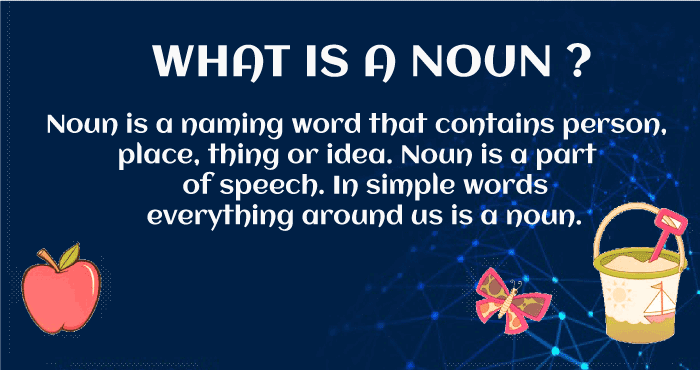
What is a noun?The noun form one of the large classes of terms or word in many languages, encompassing English Language. So in more simple terminology, It is is the word that implies a thing like a pen, pencil or book or to a person or individual like - Jerry, Bushra, Richard and an animal - like a cat, dog, cow, or a place like Dubai, London; Quality - soft, intelligent; an idea - honesty, hope, justice, and an action- moving, singing, etc. The noun is more often a single term or the word but not always like - pastry, shoe, van, and ice-cream, and so on. There are various types, categories of nouns. 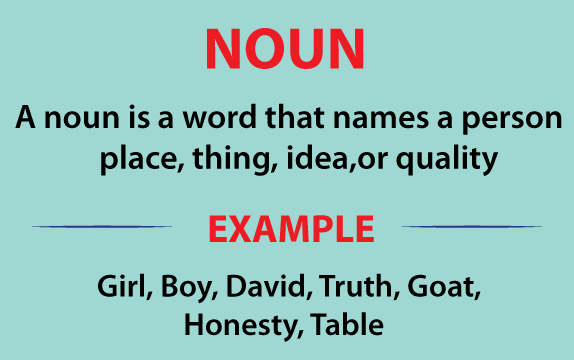
Types Of NounThe most prevalent types of nouns are the common noun and the proper noun. Common Noun- This implies to a person, location or place, or an object or thing but is certainly not the name of a specific person, place, or object, or thing. Some of the common examples include- animal, sunshine, sadness, and so on. Whereas a proper noun refers to the name of a specific person, place, or a thing and is usually commences with a capital letter like George Bush, Africa, Dubai, World War- 2 all of these are examples of proper nouns. A collective noun, like flock or squad, is a noun that denotes a collection of individuals or things. It's not always clear if a collective noun's verb should be singular or plural. In certain countries, noun like company, team, herd, public, and class, as well as the titles or the names of corporations, team, and so on, are considered singularly, however in the certain nations, they are frequently regarded or dealt as plurally: "The organization has been doing well this season," vs. "The organization have been doing well this season," (British). Gerunds implies to the nouns that are synonymous with the present participle i.e. with the (-ing form) of verbs, as in "I prefer dancing over jogging." 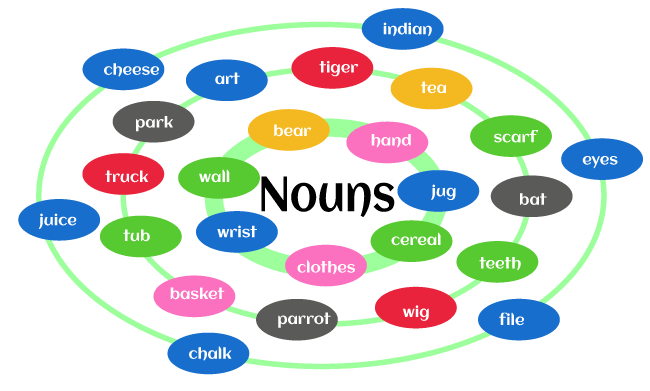
An attributive noun is one that changes the noun that comes after it, such as business in a business conference. These nouns appear to be adjectives, but they are not. The most prominent factor of a noun for English learners is whether it could be counted. A count noun is a type of noun that comes after a, an, or a digit or number (or some term that implies "more than one"). Count nouns have both singular/plural types and, like the word letter, can be utilized with both singular/plural verb forms. "There is a memo for you on the desk. Messages for you appear on regular basis." Often a count noun's plural type is equivalent as its singular type, as in "Yesterday, I witnessed a rabbit in my backyard. There are a huge amount of bison in the forest close to my place." A mass noun (also called as a noncount noun) is one that cannot be counted. Mass nouns refers to those that are not usually used after the words a, an, or a number. They have only one type and are utilized with singular verb types, such as "Spanish is one of the languages they converse in " and "The knowledge was imprecise." Some nouns are neither countable nor mass nouns. Singular nouns are nouns that only pertain to one thing: "Saturn is the 6th planet in the solar system." "People noticed a truly horrible din in the laneway." A plural noun pertains to more than one individual or a person or object or thing or to anything with two major portions. Plural nouns have only one type and are used in conjunction with plural verb types: "Townsfolk are welcomed to a task platform," "These trimmers are bland and boring." So in this case a noun can have any or all of such types of usage. (count) I have seen that book numerous times. (mass form) The clock seemed to halt when I noticed her for the very initial time. (singular form) The time is 1:24. (plural form) Petrol cost is 4X more as it was three years ago. 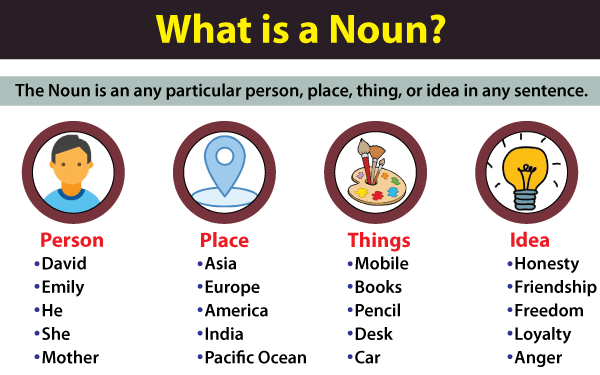
Concrete and Abstract NounsConcrete nouns are physical components that can, at least in theory (Various schools of science and philosophy may challenge the assumption, but for the most parts, people will agree on the reality about something. For example, a stone, a plant, or the cosmos), be seen or experienced by at least one of the sense (for example, chair, apple, etc.). In contrast, abstract nouns relate to abstract items, such as thoughts or thoughts (such as justice or hatred). While this demarcation is not always absolute, some nouns have different senses, encompassing both concrete and abstract ones: for instance, the noun art, which typically refers to a principle (e.g., Art is a crucial component of human culture.) but can also imply to a certain artwork in some situations (e.g., I put my child's artwork on the refrigerator.) Some abstract nouns arose etymologically as a result of figurative expansion from literal origins. Drawbacks, fractions, holdouts, and uptakes are examples of these. Likewise, certain nouns include both abstract and concrete meanings, with the latter developing from the earlier through figurative extension. View, filter, structures, and keys are examples of these. Many abstract nouns in English are generated by appending a suffix (-ness, -ity, -ion) to an adjective or verb. Happiness derived out of adjective i.e. happy), circulation derived out of verb circulate), and serene derived from adjective serene are among the instances. Gender and NounGenders are allocated to nouns in different languages, including masculine, feminine, and neuter. The gender of a noun (together with its number and case, if relevant) will frequently imply harmony in phrases that alter or connect to it. In French language, for instance, the single type of the definite article is the word "le" for male or masculine nouns and for female nouns "la"; adjective and some verb types also differ (along the inclusion of -e for female or feminine). Grammatical gender frequently coincides with the type of the noun and the inflection sequence it proceeds; for instance, many nouns concluding in -a are feminine across both Italian and Russian. Gender can also be related to the sex of the noun's reference group, especially when nouns denote people (and often animals). Nouns in Modern English are arguably genderless, despite the fact that several of them designate persons or animals of definite sex (or social gender), and pronouns that relate to nouns should have the right gender for such a noun, nouns certainly do not have gender in Modern English. (The lady has lost her glasses.) 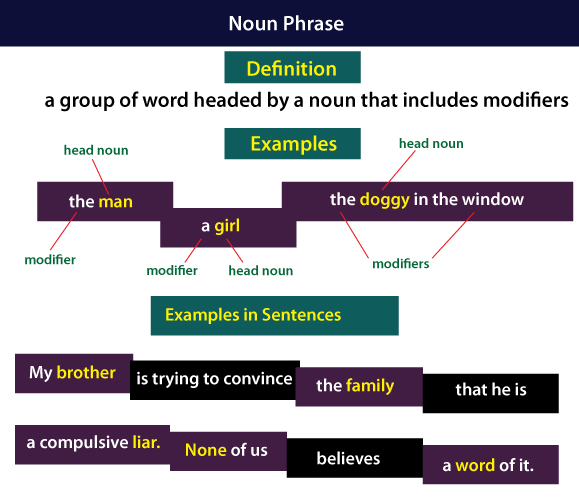
History Of NounSanskrit grammarians have been describing word classes (parts of speech) ever since the fifth-century bc. The noun (nma) is among the four major groups of words characterized in Yska's Nirukta. The Ancient Greek was equal to ónoma (o), which Plato mentioned in the Cratylus dialogue, and it was then classified as one of the 8 parts of speech in Dionysius Thrax's The Art of Grammar (2nd century BC). In Latin grammar, the phrase was nmen. All of these "noun" words were also phrases that meant "name." Through the Anglo-Norman noun, the English term or word noun comes from the Latin word. The grammatical types that the words take helped to define them. Nouns in Sanskrit, Greek, and Latin, for instance, are gendered and inflected for case and number. Adjectives are classified as nouns since they share these 3 grammatical classes. Likewise, the Latin nmen encompasses both noun (substantives) and adjective, as did the English term noun at first, with the 2 categories differentiated as a substantive noun and adjective-noun (or substantive noun and adjective-noun, or short substantives and adjectives). (The term nominal is now being used to refer to a group that encompasses both nouns and adjectives.) As the simple terms for the noun in several European languages, a relative of the term substantive is used (for example, Spanish sustantivo, "noun"). In such a dictionary, nouns are denoted by the acronym s. or sb. Rather than n., that could be used for proper noun or neuter noun alternatively . A few contemporary authors in English use the term substantive to allude to a class that comprises both noun (single words) and noun phrases (multiword phrases, also known as noun equivalents). It could also be used as a synonym for attributive when differentiating between a noun utilized as the head (primary word) of a noun phrase and a noun adjunct. The noun knee, for instance, might be said to be employed substantively in my knee hurts yet attributively in the patient required knee replacement. Nouns. 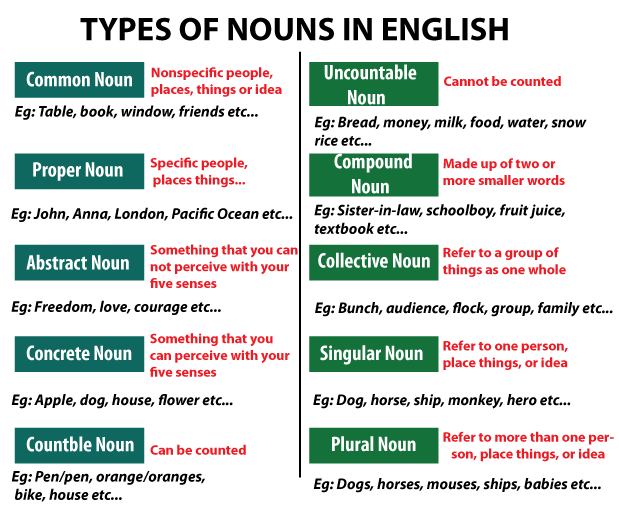
Examples The kitty sat on the table. Make sure to give your worksheets by the closure of this month. Cleanliness goes hand in hand with the godliness. Plato was a renowned philosopher in archaic times. Celebrate the night, steal, kill, and do the old sins in the new ways? Henry IV A noun can appear alongside an article or an attributive adjective. Adjectives and verbs cannot. An asterisk (*) in front of an instance indicates that it is grammatically incorrect. the name (It is certainly known as the noun: that can coexist with a definite article which here is "the") *the baptize (baptize is a form of verb: will never coexist along a definite article) constant circulation (noun in this is circulation: It can easily coexist along attributive adj., which here is constant) *constant circulate (verb here is circulate: will never coexist along attributive adj. constant) a fright (here noun is fright: It can easily coexist with the indefinite article which here is a) *an afraid (adj.here is afraid: will never coexist along with the article a) terrible fright (the noun which is here fright It can easily coexist with the adj. terrible) *terrible afraid (afraid which is adj. will never coexist with the adj. terrible)
Next TopicTypes Of Noun
|
 For Videos Join Our Youtube Channel: Join Now
For Videos Join Our Youtube Channel: Join Now
Feedback
- Send your Feedback to [email protected]
Help Others, Please Share










